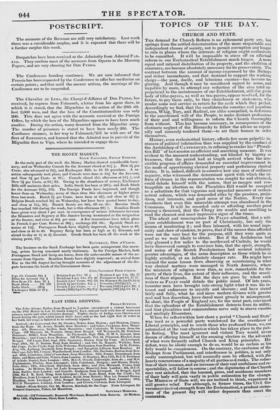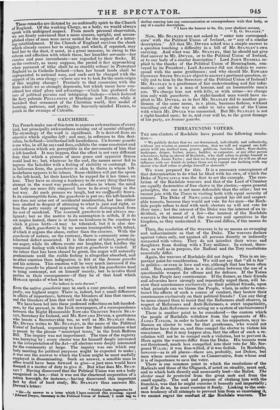TOPICS OF THE DAY.
CHURCH AND STATE.
THE demand for Church Reform is no ephemeral party cry, but springs from the settled determination of the more respectable and independent classes of society, not to permit corruption any longer to rule in places where the interests of religion ought exclusively to be consulted. It will be impossible to stave off an effectual reform in our Ecclesiastical Establishment much longer. A more equal and rational distribution of its property, and the abolition of sinecures, are become absolutely necessary for its preservation. The contrast between the amount of income engrossed by the Bishops and richer incumbents, and that destined to support the working clergy-the poor, docile, and laborious curates-has become too glaring. And though it may be considered unjust by some, and impolitic by more, to attempt any reduction of the sum total ap- propriated to the maintenance of our Establishment, still the great body of tithe-payers, as well as tax-payers, appear resolved, for the future, to pay those only, be they churchmen or statesmen, who render some real service in return for the cash which they pocket. Accordingly we find, that the candidates for counties and populous places, Whig, Tory, and Radical, are alike compelled, in deference to the ascertained will of the People, to make distinct professions of their zeal and willingness to reform the Church thoroughly from without. This has become necessary, in consequence of the obstinate neglect of the Hierarchy to follow the advice so repeat- edly and sincerely tendered them-to set their houses in order themselves.
History, even ecclesiastical history, affords few more palpable in- stances of political infatuation than was supplied by the conduct of the Archbishop of CANTERBURY, in refusing to render his " Plurali- ties Bill " of last session an efficient and searching measure. It was evident to the meanest understanding, not blinded by bigotry or baseness, that the period had at length arrived when the irre- sistible progress of affairs demanded an essential improvement in the mode of apportioning clerical property and performing clerical duties. It is, indeed, diffibult to conceive how any man of ordinary sagacity, who witnessed the determined spirit with which the re- form of abuses in the representation was sought for and obtained, could delude himself with the notion, that so meagre and con- temptible an abortion as the Pluralities Bill would be accepted as a substitute for that vigorous and impartial measure of ecclesi- astical reform, which was demanded alike by the passions, preju- dices, real interests, and good sense of the Nation. Every one recollects that even this miserable attempt was abandoned in the Commons. It will be recorded only as affording another proof among a thousand, that the Clergy are unable and unwilling to read the clearest and most impressive signs of the times.
The adroit and unscrupulous Dr. PALEY admitted, that a reli- gious establishment was no part of Christianity, but only the means of inculcating it ; and then laboured, with his usual inge- nuity and show of candour, to prove, that if the means thus afforded were not the very best for the purpose, still they were quite as good as we were likely to obtain. But if the Archdeacon had only glanced a few miles to the northward of Carlisle, he would have discovered enough to convince him, that the spirit, strength, and union of the Scotch Presbyterians had secured infinitely greater advantages, of the same description as those which lie so highly extolled, at an infinitely cheaper rate. He might have learned the same lesson from observing or ascertaining in what way clerical matters were managed in North America, where the ministers of religion were then, as now, remarkable for the purity of their lives, the extent of their influence, and the scanti' mess of their stipends. But the days are gone by when such writers as PALEY could delude the public mind. Of late years, honester men have brought into strong light what it was his in- terest and endeavour to mystify and obscure ; and have stated fairly and fully, what he and more modern divines with greater zeal and less discretion, have dared most grossly to misrepresent. In short, the People of England are, for the most part, convinced that the splendour of the Establishment detracts from its utility, and that pluralities and commendams serve only to starve curates and multiply Dissenters. When we reflect within how short a period "Church and State" was used as a powerful party watchword for the overthrow of Liberal principles, and to crush those who professed them, we,are astonished at the vast alteration which has taken place in the pub- lic feeling. The most ignorant and violent Tory would never dream of offering himself at the ensuing election as the advocate of what were formerly called Church and Kin°.b principles. His defeat, were he idiotic enough to do so, would be as certain as his folly would be conspicuous. On the contrary, the exclusion of the Bishops from Parliament, and interference in politics, is not only coolly contemplated, but will assuredly soon be effected, with he hearty concurrence of a majority of all parties and ranks. The reduc- tion of their incomes,and an increase of their real usefulness and re- spectability, will follow in course • and the dignitaries of the Church may rest satisfied, that the learned, pious, and assiduous members of their body will gain vastly in public estimation by the change. The Ministers of State will, we are inclined to think, experience a still greater relief. For although, in former times, the Civil Go- vernment doried strength from the Ecclesiastical, a prudent states- man of the present day will rather deprecate than court the connexion. _.. These remarks are dictated by no unfriendly spirit to the Church of England. Of the working Clergy, as a body, we would always speak with unfeigned respect. From much personal observation, we are firmly convinced that a more sincere, upright, and accom- plished class of men were never united for the support of a totter- ing establishment. If the Church of England survives the shock which already causes her to stagger, and which, if repeated, may burl her to the dust, it must, in a great measure, be owing to the esteem and affection with which these, her humbler servants—her curates and poor incumbents—are regarded by their flocks. If, on the contrary, as many suppose, the period is fast approaching when payment of tithe shall be as sturdily refusee. in Protestant England as in Catholic Ireland—when her broad lands shall be appropriated to national uses, and each sect be charged with the support of its own clergy—where are we to look for the main origin of this mighty change? Precisely to that connexion with the State which we so strongly deprecate, but which many have con- sidered her chief glory and advantage—which has produced the race of political parsons and intriguing bishops—which fostered the fiery polemic PHILLPOTTS at Stanhope and Exeter, while it banished that ornament of the Christian world, that model of learning, patience, and purity, the heavenly-minded HEBER, to perish in the swamps of Calcutta.



























 Previous page
Previous page